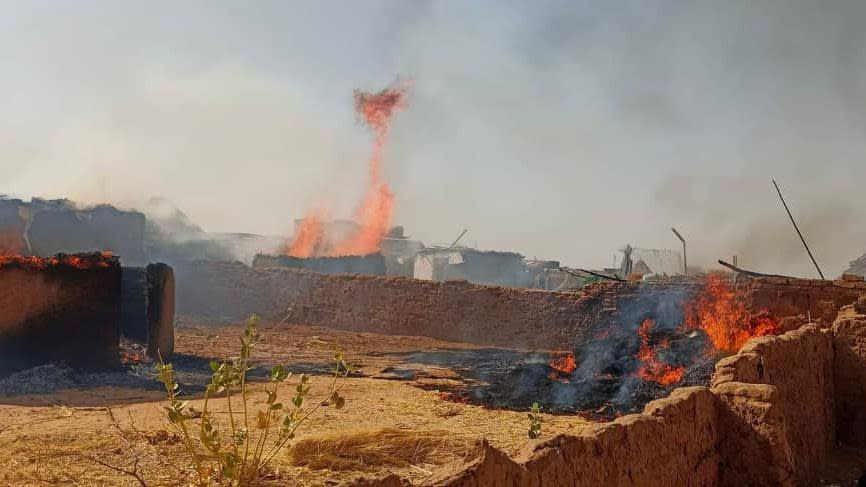I couldn’t bury my brother because of Sudan bombing
Fierce fighting in Sudan’s besieged city of El Fasher has become so intense that Mohamed Haroon Abdallah has been unable to bury his brother.
He was injured last week in an attack on the city in the western region of Darfur and died on Monday.
“I had to abandon my brother’s body on my way to the cemetery,” Mr Abdallah, 30, told the BBC.
New satellite images show the paramilitary Rapid Support Forces (RSF), which is battling to wrest control of the city from the army, has been deliberately targeting the Ab Shouk camp, where Mr Abdallah and an estimated 100,000 others live having fled an earlier ethnic conflict.
The rival military factions have been fighting each other nationwide since April 2023 – and in Darfur the violence has recalled the ethnic cleansing unleashed by Arab militias on non-Arab communities two decades ago.

The satellite images analysed by Yale University’s Humanitarian Research Lab (HRL) show how the RSF is targeting civilian dwellings in and around El Fasher, the army’s last stronghold in Darfur.
“There is clear evidence of intentional burning of civilian structures and bombardment,” Nathaniel Redmond, director of the lab, told the BBC.
“At present approximately 100 football pitches-worth of civilian dwellings have been destroyed in the past two weeks of the fighting.”
He warned that having been under siege since mid-April, the army was now struggling to get supplies and the final battle was likely to be “a genocidal bloodbath”.
The UN special adviser on the genocide prevention has said the risk of genocide is growing every day.
“In Darfur and El Fasher, civilians are being attacked and killed because of the colour of their skin, because of their ethnicity,” Alice Wairimu Nderitu told the UN Security Council on Tuesday.
The army has also been accused of indiscriminate shelling and aerial bombing in densely populated areas.
El Fasher resident Ibrahim al-Tayeb al-Faki said his sister was killed in a military airstrike that had also destroyed his home.
The 47-year-old told the BBC he had sent his three children to live with their grandfather but his house was also hit. The family is now sheltering in its ruins.
“There is no safe place in El Fasher right now,” he said.
Medical charity Médecins Sans Frontières (MSF) said staff at a hospital it operated in the city were struggling to cope.
Since the fighting began in the city on Friday 10 May, 809 casualties had arrived at South Hospital and 93 had died, MSF said.
The hospital had only one surgeon and more than 70 people were waiting for operations, MSF’s Claire Nicolet told the BBC, warning that medical supplies would soon run out.
The situation is no different at Saudi Hospital, run by the Ministry of Health, which has been partially damaged.
Its medical director Modther Ibrahim Suliman told the BBC that the water and solar systems had been destroyed and they were operating under “very difficult” conditions.
El Fasher residents say that access to food and water has become increasingly difficult. The RSF has been attacking the city from three sides and blocked all supply routes.
“Survival is incredibly challenging,” 32-year-old lawyer Mahmoud Ahmed Adam, who has had to move repeatedly to escape the fighting, told the BBC.
“Many people are living in schools and refugee centres that lack basic services or aid,” he said.
Mr Abdallah, who lost his brother, said Ab Shouk camp’s Al Saalam School was now doubling as a shelter for those who had recently lost their homes.
It had also been shelled this week, resulting in a young girl losing her leg.
“She is currently receiving first aid at the camp’s clinic as there is no means to take her to South Hospital,” he said.
The satellite maps show the scale of destruction in El Fasher:
-
Red: Thermal scarring observed between 14 – 18 May 2024
-
Orange: Thermal scarring observed between 9 – 14 May 2024
-
Yellow: Thermal scarring observed between 1 – 9 May 2024
-
Black: Thermal scarring observed between 21 March – 29 April 2024
More BBC stories on Sudan:


Go to BBCAfrica.com for more news from the African continent.
Follow us on Twitter @BBCAfrica, on Facebook at BBC Africa or on Instagram at bbcafrica
